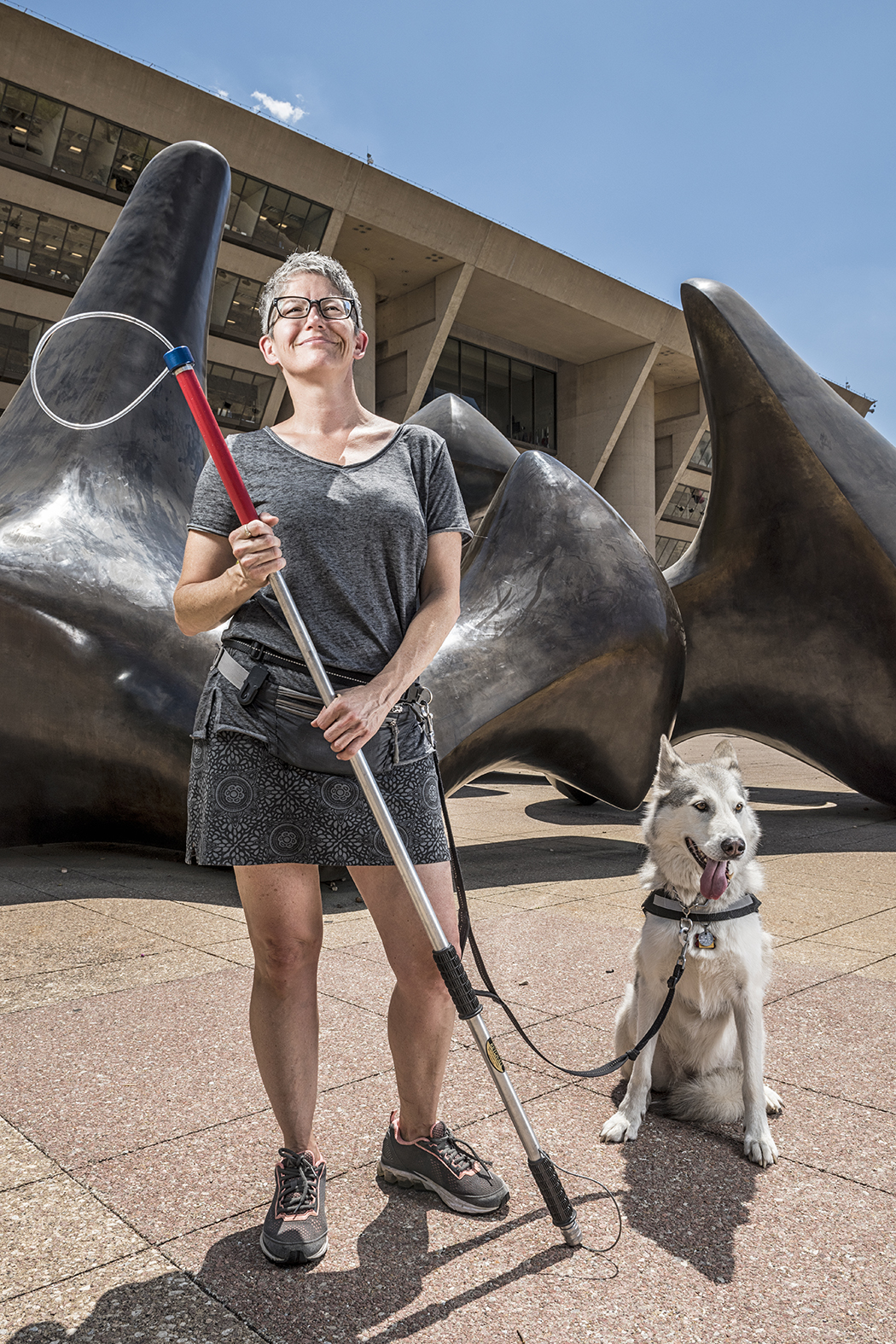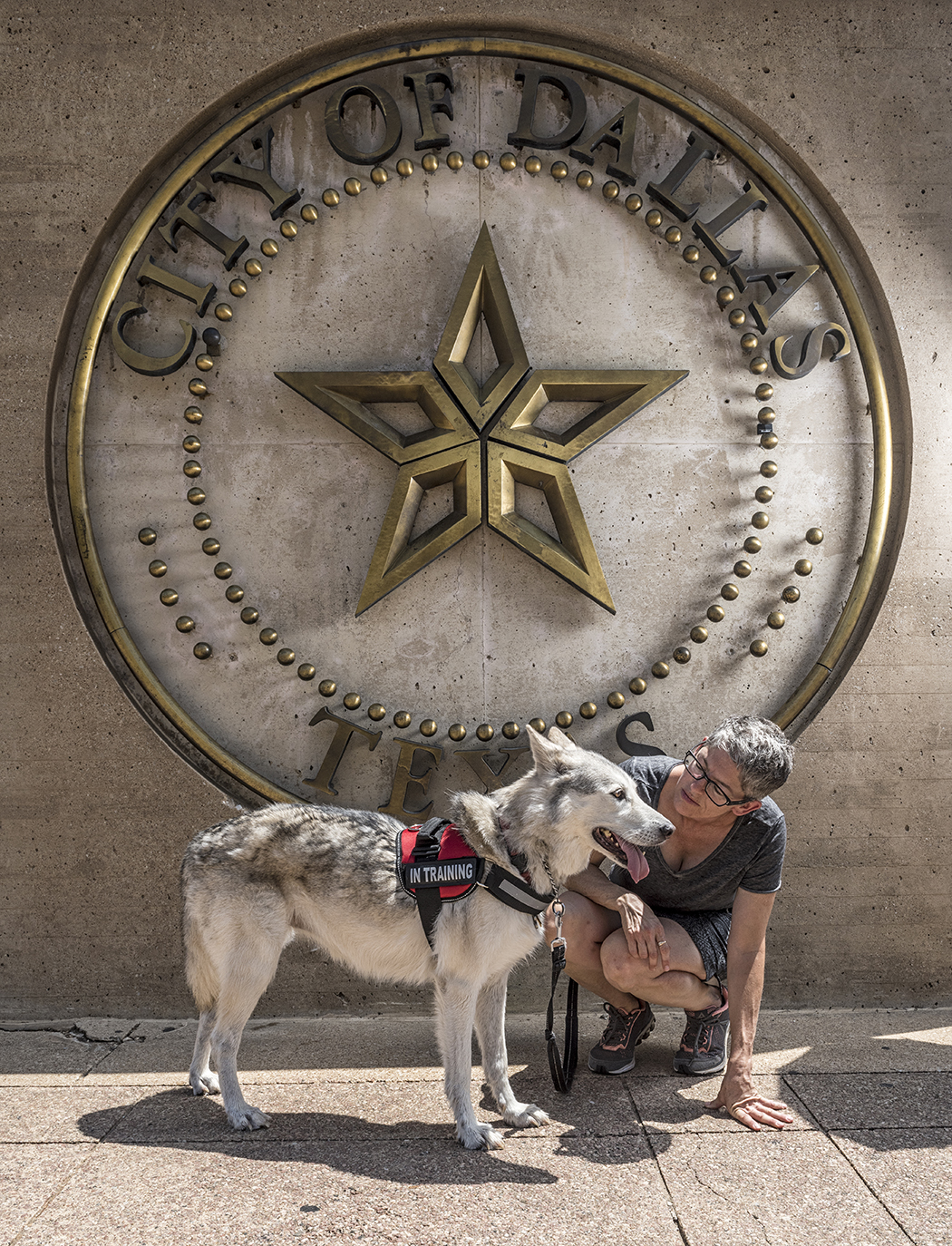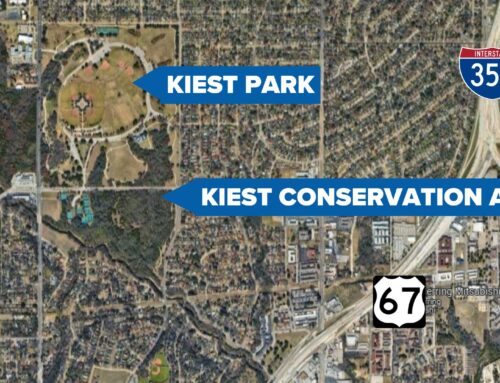Fran Gaconnier recently planted flowers in her South Winnetka front yard, and she tries to keep the ever-rotating pack of dogs that live in her house from peeing on them.
This is an improvement from six or seven years ago, when Gaconnier began taking in troubled dogs while simultaneously taking on the City of Dallas’ animal-services department.
It all started with a pack that was roaming the Winnetka Heights area in the summer of 2011. Gaconnier and other neighbors called Dallas Animal Services about this menacing pack, but no one came. In a few weeks the pack grew from six to 15 dogs.
“I couldn’t get out to my driveway to go to work,” she says.
Still, the city did nothing.
So she and her neighbors started trapping loose dogs themselves and taking them to the city shelter.
“That’s when we started to see how broken the system really is,” Gaconnier says.
Eventually she captured the injured female from that front-yard pack, and a vet later found it had been shot with an animal-control dart.
She rehabilitated that dog, Tasha, now a house pet and a muse for Gaconnier’s work.
“I committed that another dog would not be worse off for our intervention,” Gaconnier says. “She was treated inhumanely, and that is completely unacceptable to me, and I pledged not to stop until things change.”
Dallas Animal Services had messed with the wrong dog lady.
Gaconnier and a loose network of neighbors began calling themselves Gypsy Dog Ops. It’s not a rescue, Gaconnier says. It’s a mission to fix Dallas’ animal-control system. They’ve been described as “rogue rescuers,” and they’ve gone toe-to-toe with Dallas Animal Services, whose former director currently is under investigation around dealings with a nonprofit that serves the shelter.
Dallas Animal Services is under new management, and things have improved, but Gypsy Dog Ops is still watching.
“My story is a complicated story,” Gaconnier says. “But in a way, it’s the story of our neighborhood.”
The first step was training their watchdogs. They encouraged neighbors to call 311 when they saw loose dogs. Use the system that’s in place, however broken, and then hold it accountable.
Gaconnier asked neighbors and friends to alert her when they saw certain strays that she was trying to catch — one in-heat breeder equals six new dogs in two months. A neighbor bought Gaconnier a professional catchpole, and she’s made herself an expert at catching and rehabbing street dogs.
Catching stray dogs can be difficult, but also, it’s the easy part.
Gypsy Dog Ops started investigating animal services. They found the department had taken 15,000 unanswered calls in one year. They mapped dog-bite data and found that the vast majority of attacks happen in southern Dallas.
Through open records requests, they uncovered a swamp that invited a Dallas Morning News investigation, heat from City Council and eventually, procedural and financial audits.
 Change came too late, unfortunately.
Change came too late, unfortunately.
In August 2015, a stray dog attacked Winnetka Heights resident Charlie Howell while he and his wife were walking their dogs. He was bitten in his hand, face and groin, and his injuries were so severe that he almost lost his hand.
After that, he sued the city, hired a lawyer and scheduled a deposition before they would release information about what happened to the dog that attacked him.
Less than a year after that attack, in May 2016, a pack of dogs mauled 52-year-old Antoinette Brown in South Dallas. She was put into a coma with more than 100 dog bites and died a week later.
“We kept saying, ‘Someone is going to be killed,’ and then someone was killed, and it’s heartbreaking,” Gaconnier says. “She died because of a civil rights violation, because the city was not serving the north and south sides equally. And to me, that’s the tragedy.”
The city finally shook up the leadership of animal services. And some big money was given to Dallas’ animal problem.
A $13.45-million private grant, which deploys mobile surgery units to perform free spay and neuter operations in neighborhoods that need them most, fixes 46,000 animals a year.
“It’s an intense amount of money,” Gaconnier says. “The funders know that it’s a public safety issue and it’s around a disparity of service for communities of color.”
But more work is needed.
Ronnie Bell lost an arm and nearly died after a dog attack in South Dallas this past June.
Stopping dog bites means shining a light on problems at the core of Dallas, including poverty and transportation, Gaconnier says. She hopes the city will do more to “elevate pet culture” in southern Dallas.
Meanwhile, Gaconnier took a hiatus from her career in broadcast post-production to tackle Dallas’ dog problem fulltime. She spent money that was meant to renovate her house to instead pay for vet services and open her home to difficult canines.
They’ve ripped up linoleum and destroyed a fridge.
It’s taken over her life.
“I cannot sit down and live in this city and not do anything about it,” she says. “Raising up our community is the most important thing we can do. Who cares what we can accomplish if people are being mauled to death?”






